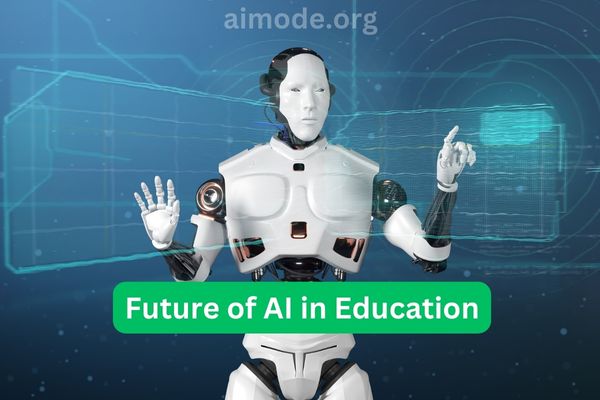The Future of AI in Education: The world is about to witness a complete revolution in education. The impact of artificial intelligence in learning, teaching, and managing schools. AI is positioned for personalizing the learning experience, democratizing access to education and redefining the teacher’s role in the class.
Visualize a room with its own life that has transformed into an immersive landscape, AI tutors acting like digital Sherpas, robots buzzing around to grade and evaluate essays as teachers direct energetic debates. It’s the not-so-far future of artificial intelligence-powered education, which is not science fiction.
Also See: Future of Artificial Intelligence in Business: AI Will Change IT
Adaptive learning is the next generation in learning and teaching. AI algorithms will gauge what a student is good at, bad at, and how they learn, developing a customized program that changes on the fly. Examples include instant feedback on math problems, virtual reality tour to ancient Rome or the AI driven language learning which adapts to your speed.
The Future of AI in Education: Changing the Whole World
However, AI does not intend to substitute teachers; rather, it serves to strengthen them. Teachers freed from routine tasks such as grading would have additional time to support, motivate and awaken curiosity in the students. On the other hand, teachers should help students move through knowledge labyrinths, developing critical thinking and social skills.
Classroom will become a dynamic learning center. See walls talking lessons, furniture moving around for group works or individual work, and robots making life easier for students with disabilities. This virtual reality will take them to the far corners of the universe. They can also travel through abstract entities like oceans, volcanoes or even go on an excursion to Mars itself, which makes abstract concepts concrete and unforgettable.
Personalized Learning at Scale
- One of the most exciting applications of AI in education is personalized learning. Imagine a world where every student receives a customized learning experience tailored to their individual needs, strengths, and weaknesses. AI-powered algorithms can analyze a student’s learning data, including test scores, assignments, and engagement levels, to create a personalized learning path. This path can adapt in real-time, providing targeted instruction, feedback, and resources to help each student reach their full potential.
- Personalized learning platforms can go beyond academics, supporting students’ social and emotional development as well. AI-powered chatbots can act as virtual mentors, providing guidance and support to students struggling with anxiety, loneliness, or other challenges. Imagine a virtual tutor that can patiently explain a complex math concept or a language learning app that adjusts its difficulty based on your progress. These are just a few examples of how AI can personalize learning and make education more engaging and effective for every student.
Also See: Future of Artificial Intelligence in Marketing: How it is Evolving
Intelligent Classrooms and Adaptive Learning
- The traditional classroom is also evolving with the help of AI. Imagine a classroom where the walls are interactive displays, and the furniture can reconfigure itself to suit different learning activities. AI-powered systems can monitor student engagement in real-time, adjusting the pace and difficulty of the lesson based on their needs. Virtual reality can transport students to any corner of the globe, from the depths of the ocean to the surface of Mars, bringing abstract concepts to life in immersive and interactive ways.
- AI can also automate administrative tasks, freeing up teachers’ time to focus on what they do best: guiding, inspiring, and supporting their students. Imagine a system that automatically grades essays, schedules appointments, and manages student data. This would allow teachers to spend more time interacting with students, providing personalized feedback and support.
Challenges and Ethical Considerations
- While the potential of AI in education is vast, there are also challenges and ethical considerations that need to be addressed. If these algorithms are not carefully designed and monitored, they could perpetuate existing inequalities and disadvantage certain groups of students. Another concern is the potential for AI to dehumanize education, replacing human interaction with automated systems. It is important to ensure that AI is used to enhance, not replace, the role of teachers in the classroom.
Also See: Future of AI in Agriculture: Its Now Happening
The Future of AI in Education
- Despite the challenges, the future of AI in education is bright. The key is to use AI responsibly and ethically, ensuring that it benefits all students and helps us create a more equitable and effective education system for the future.
Here are some additional thoughts on the future of AI in education:
- The role of teachers will shift from delivering content to guiding and facilitating learning. Teachers will become more like coaches and mentors, helping students navigate their personalized learning paths and develop critical thinking skills.
- Education will become more accessible and inclusive. AI-powered tools can translate languages, provide real-time captions for lectures, and offer alternative learning formats for students with disabilities.
- Learning will become more lifelong and self-directed. AI-powered platforms can provide personalized learning experiences anytime, anywhere, making education more accessible and convenient for everyone.
Also See: Future of Ai in Construction: It is Here Now
Of course, challenges remain. Data privacy, algorithmic bias, and ensuring equitable access are crucial hurdles to overcome. But when used responsibly, AI has the potential to democratize education, making it accessible and engaging for all.
So, the future of AI in education isn’t about replacing teachers or classrooms; it’s about building a vibrant, personalized learning ecosystem where every student, regardless of background, can reach their full potential. It’s a future where education becomes a lifelong adventure, fueled by curiosity, collaboration, and the boundless possibilities of AI.
